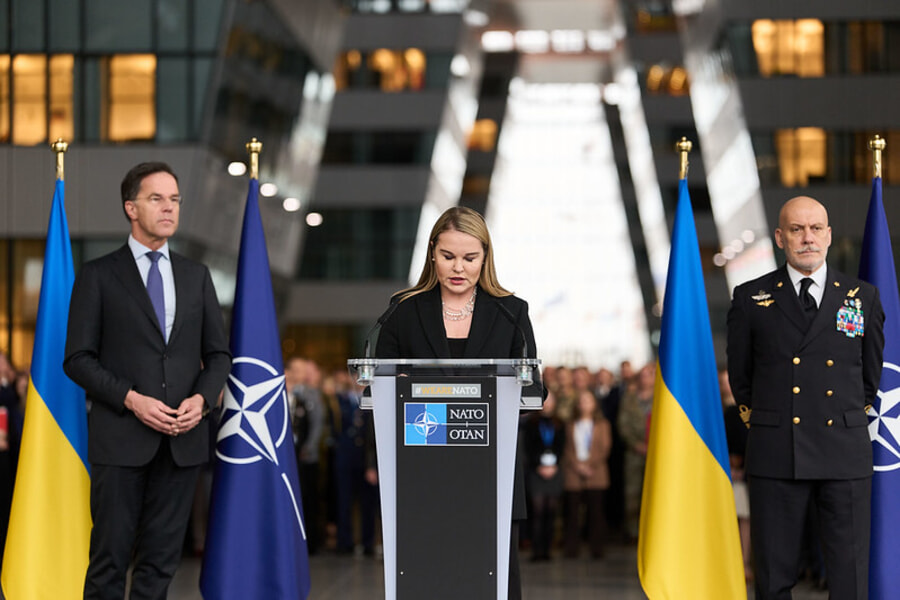Making Sense of the ICJ's Provisional Measures in South Africa v. Israel
What the court ordered of Israel, where the judges came down, and what’s next for South Africa’s case alleging Israel’s violation of the Genocide Convention in Gaza

This morning, just two weeks after hearing arguments on South Africa’s request for provisional measures in its case against Israel under the Genocide Convention, the International Court of Justice (ICJ) announced its decision on that request.
The court found that it has prima facie jurisdiction over this dispute under the Genocide Convention and that “at least some” of South Africa’s claims that Israel is violating the convention are plausible. Because of the urgency of the situation and the risk of irreparable harm, the court issued provisional measures pending a final adjudication of South Africa’s claims. Proceedings on the merits will likely take years to complete. Not surprisingly, Israel failed to persuade the court to dismiss the case entirely at this early stage.
The court did not order Israel to cease all military operations, as South Africa had asked. This makes sense because, unlike Russia’s invasion of Ukraine (in which the court did order a complete cessation), Israel has an obligation to protect its population from Hamas within the limits of international law. The court did not delve into the other applicable laws governing Israel’s conduct, which are beyond the scope of the Genocide Convention. However, it did “emphasize that all parties to the conflict in the Gaza Strip are bound by international humanitarian law.” It also called for the “immediate and unconditional release” of the hostages held by Hamas and other armed groups. Because the court’s jurisdiction is limited to the parties before it and to the subject-matter of the Genocide Convention, these calls did not form part of the legally binding order, but they are nonetheless significant.
The most notable feature of the court’s opinion is its near-unanimity. ICJ President Joan Donoghue (the U.S. judge) delivered a summary of the reasons and read the order with a calm and authoritative demeanor before a packed courtroom. The text of the opinion systematically lays out the applicable legal framework and highlights some of the important considerations that animated the court’s order.
The provisional measures order resembles the court’s similar order in The Gambia v. Myanmar more than it does the order in Ukraine v. Russia. Under the terms of the order, Israel must:
(1) Take all measures within its power to prevent the commission of all acts prohibited by the Genocide Convention, in relation to Palestinians in Gaza. Prohibited conduct includes any of the following with the intent to destroy the group in whole or in part: (a) killing members of the group; (b) causing serious bodily or mental harm to members of the group; (c) deliberately inflicting on the group conditions of life calculated to bring about its physical destruction in whole or in part; (d) imposing measures intended to prevent births within the group. (Indicated by a vote of 15-2, with Judge ad hoc Aharon Barak and Judge Julia Sebutinde voting against.)
(2) Ensure with immediate effect that its military does not commit any of the prohibited acts. (Indicated by a vote of 15-2, with Barak and Sebutinde voting against.)
(3) Take all measures within its power to prevent and punish the direct and public incitement to commit genocide in relation to members of the Palestinian group in the Gaza Strip. (Indicated by a vote of 16-1, with Sebutinde voting against.)
(4) Take immediate and effective measures to enable the provision of urgently needed basic services and humanitarian assistance to address the adverse conditions of life faced by Palestinians in the Gaza Strip. (Indicated by a vote of 16-1, with Sebutinde voting against.)
(5) Take effective measures to prevent the destruction and ensure the preservation of evidence related to allegations of acts prohibited by the Genocide Convention. (Indicated by a vote of 15-2, with Barak and Sebutinde voting against.)
(6) Submit a report to the court on all measures taken to give effect to the court’s order within one month. (Indicated by a vote of 15-2, with Barak and Sebutinde voting against.)
The court made clear that this order does not prejudge any future decisions by the court on its jurisdiction under the convention, or the admissibility or merits of the case. In part for this reason, it declined South Africa’s invitation to order Israel to “desist” from committing prohibited acts. It also declined the invitation to order access to Gaza by fact-finding missions and to order Israel not to do anything to aggravate the dispute or make it more difficult to resolve (an order that the court may issue to both parties in contentious cases).
Although there is no international police force to enforce the court’s order, it is legally binding, and there is no reason to think that Israel will not submit the required report. The more important question, of course, is how Israel will implement the rest of the order. In Israel’s view, none of its actions are genocidal, and its attorney general has recently announced that “several cases” of incitement are being examined by Israeli law enforcement authorities. The court’s order clearly indicates that such unilateral undertakings are insufficient.
“Immediate and effective measures” to enable the provision of basic services and humanitarian assistance should create a meaningful and visible difference on the ground. It is no exaggeration to say that the world will be watching, despite the lack of sufficient access to Gaza by journalists to report on humanitarian conditions. Israel is now “on notice” that its conduct could be considered genocidal, and that the ICJ will very likely scrutinize its actions in order to make an eventual determination about South Africa’s claims on the merits. The court quoted at length from statements made by Israeli Defense Minister Yoav Gallant, Israeli President Isaac Herzog, and then-Minister of Energy Israel Katz, as well as the record of devastation on the ground (including widespread malnutrition and displacement, the imminent risk of famine, and the increase in maternal and newborn death rates), to show that South Africa has claimed “plausible rights” under the Genocide Convention with respect to Palestinians in Gaza.
Judge Xue Hanqin from China appended a declaration to the opinion, as did Judge Dalveer Bhandari from India and Judge Georg Nolte from Germany. Xue emphasized that South Africa’s standing to bring claims against Israel should be the “least controversial” in the situation of a protected group “such as the Palestinian people,” given that the question of Palestine has been on the agenda of the United Nations since its founding. (Xue also joined the court’s provisional measures order in The Gambia v. Myanmar, but she wrote separately to express her view that the evidence and documents submitted to the court showed “a protracted problem of ill-treatment of ethnic minorities in Myanmar rather than of genocide”). Bhandari’s declaration highlighted that the standard of plausibility for granting provisional measures is much lower the legal test that the court has previously applied at the merits stage, which permits inferring genocidal intent from a pattern of conduct only if “this is the only inference that could reasonably be drawn from the acts in question.”
Judges serve in the ICJ in their personal capacities and not as representatives of states, but they often approach the proceedings through the lens of their nationality (which is one reason why no two sitting judges can come from the same country). Nolte’s declaration can be read alongside Germany’s announcement that it plans to intervene in the ICJ proceedings on Israel’s behalf. This is consistent with Germany’s past interventions to clarify the applicable legal standards in cases brought under the Genocide Convention, although the announcement (on the same day that Israel presented its argument against provisional measures) has been criticized as political. Nolte’s declaration explicitly acknowledges Israel’s special status as a country “established in 1948 as a homeland offering protection to the Jewish people, including against another genocide,” and that “persons associated with Hamas remain responsible for any acts of genocide that they may have committed.” It notes that “the Genocide Convention is not designed to regulate armed conflicts as such” and that all parties “remain legally responsible for any possible breaches by them of other rules of international law, including international humanitarian law,” even though such breaches fall outside the scope of the ICJ’s jurisdiction. Like Bhandari, Nolte emphasizes the difference between the applicable legal threshold at the provisional measures stage and the much more stringent legal test for finding genocidal intent at the merits stage. He notes the lack of precision in the court’s jurisprudence about the “plausibility” standard and in the court’s explanation of its reasons for finding that this standard is satisfied. In his view, South Africa did not plausibly show that “the military operation undertaken by Israel, as such, is being pursued with genocidal intent,” in part because South Africa failed to engage with evidence weighing against the inference of genocidal intent. However, Nolte voted in favor of the provisional measures because South Africa did make a plausible claim that “certain statements by Israeli State officials, including members of its military, give rise to a real and imminent risk of irreparable prejudice to the rights of Palestinians under the Genocide Convention,” whether or not they amount to prohibited “direct and public incitement to commit genocide.” Israel has an obligation to prevent, not just to refrain from, acts prohibited under the convention.
Judge Julia Sebutinde from Uganda, who was the only member of the court to vote against all of the provisional measures, wrote a dissenting opinion. Notably, Sebutinde has extensive experience in international criminal law, including as a judge on the Special Court for Sierra Leone. In her view, the dispute between “the State of Israel and the people of Palestine is … a political one, calling for a diplomatic or negotiated settlement, … not a legal dispute susceptible of judicial settlement by the Court.” She also expressed (understandable) concern that the court’s order will be read incorrectly as a determination that the court has jurisdiction under the Genocide Convention and/or that Israel has violated the treaty—both of which await determination at a later stage. In her view, this case is an example of failed diplomacy that sometimes leads states “to resort to a pretextual invocation of treaties like the Genocide Convention, in a desperate bid to force a case into the context of such a treaty, in order to foster its judicial settlement: rather like the proverbial ‘Cinderella’s glass slipper.’” Her dissenting opinion recites the broad outlines of the history of the Israeli-Palestinian conflict from 1947, when the General Assembly recommended a partition plan and the creation of two independent states. She recounts that “[u]nfortunately, the rejection of the partition plan by certain Arab leaders and the outbreak of war in 1948 prevented the realization of the laudable goal of two States for two peoples.” Intervening events have made clear that “a permanent solution to the Israeli-Palestinian conflict can only result from good faith negotiations between Israeli and Palestinian representatives working towards a just and sustainable two-State solution,” not by judicial settlement or outside imposition. Moreover, in her view, “South Africa has not demonstrated, even on a prima facie basis, that the acts allegedly committed by Israel … were committed with the necessary genocidal intent and that, as a result, they are capable of falling within the scope of the Genocide Convention.” To the extent that the court has ordered Israel to prevent and not to engage in genocidal acts, this is redundant of its existing obligations under the Genocide Convention. Moreover, in Sebutinde’s view, the order to enable the provision of basic services and humanitarian aid (which, she indicates, appears to be improving) is beyond the scope of the court’s authority under the Genocide Convention, because there is not a sufficient link between the measure and the rights claimed under the convention. There is also no basis to order the preservation of evidence absent a showing that Israel is deliberately destroying it. Finally, given that South Africa allegedly “ha[s] enjoyed and continue[s] to enjoy a cordial relationship with the leadership of Hamas,” then South Africa should “use whatever influence [it] might wield to try and persuade Hamas to immediately and unconditionally release the remaining hostages, as a good will gesture [that] would go a very long way in defusing the current conflict in Gaza.”
Judge ad hoc Aharon Barak from Israel wrote a separate opinion. Like Sebutinde, he saw no basis to order Israel to preserve evidence, to comply with its existing obligations not to engage in harmful acts with genocidal intent, or to submit a compliance report. However, he joined the majority in ordering Israel to take all measures in its power to prevent and punish the direct and public incitement to commit genocide and to enable the provision of urgently needed basic services and humanitarian aid. Even though South Africa has, in his view, “wrongly sought to impute the crime of Cain to Abel,” the court has properly “reaffirmed Israel’s right to defend its citizens and emphasized the importance of providing humanitarian aid to the population of Gaza.” Barak’s opinion is part autobiography and part analysis. It seeks to educate the public about the role of Israel’s Supreme Court, and some of Barak’s own prior opinions, in restraining military actions in the name of human rights and international law. (As I wrote in a prior article, some observers argue that the court under Barak’s stewardship went too far; others that it did not go far enough.) He affirms (perhaps for an international audience, perhaps for an Israeli audience, and perhaps also for himself) that “[g]overnments have been replaced, new justices have come to the Supreme Court, but the DNA of Israel’s democracy does not change.” Like Sebutinde, he laments South Africa’s decision to resort to adjudication rather than engaging diplomatically. He also adds details about the Oct. 7 attacks and Hamas’s vow to “repeat Oct. 7 again and again” while “seek[ing] to immunize its military apparatus by placing it within and below civilian infrastructure, which is itself a war crime.” In light of the circumstances, the appropriate “legal prism” for the current situation is international humanitarian law (IHL), not the Genocide Convention.
Barak acknowledges the different legal thresholds at the provisional measures and the merits stages, but he faults the court for its approach to plausibility on the question of specific intent given that “there is no evidence comparable to that available to the Court in the Gambia case.” The inappropriate statements by “certain Israeli officials” will have to be investigated by the competent Israeli authorities, but it is “plainly implausible” to infer an intent to commit genocide from these statements, especially since they “were made in the wake of horrific attacks against the Israeli population.” Even though he disagrees that South Africa’s claims meet the plausibility threshold, Barak indicated that he voted in favor of the provisional measure regarding public incitement “in the hope that the measure will help to decrease tensions and discourage damaging rhetoric.” He voted for the provisional measure on basic services “guided by my deep humanitarian convictions and the hope that this will alleviate the consequences of the armed conflict for the most vulnerable,” even though the obligation arises (in his view) under IHL rather than the Genocide Convention. He also regrets the court’s inability to order South Africa to take measures to protect the rights of the hostages and to facilitate their release by Hamas. Perhaps aware that he will likely be criticized by both sides for his views, he closed his opinion by emphasizing that “[m]y compass is the search for morality, truth and justice,” which are the values “that Israel’s daughters and sons have selflessly paid with their lives and dreams [to protect], in a war that Israel did not choose.”
As the headlines about this judgment accumulate and opinions are formed (often, but not always, based on preconceived ideas), one can hope that many will take time to read these judges’ thoughtful contributions in an especially emotionally and politically charged case. This is only the beginning; the next step will be for the court to set time limits for filing submissions on issues relating to jurisdiction, admissibility, and the merits. Israel’s first compliance report will be due to the court in one month, and South Africa will have an opportunity to respond. Meanwhile, Israel will be busy preparing for arguments in advisory (nonbinding, but influential) proceedings on the legal consequences arising from its policies and practices in the occupied Palestinian territory, which are taking place in response to a request from the U.N. General Assembly. Public hearings in that case are scheduled to begin on Feb. 19, after four newly elected ICJ judges take their seats on the bench.




